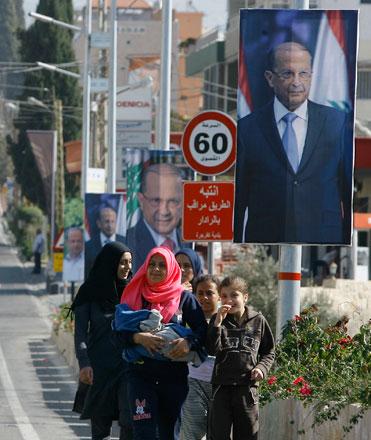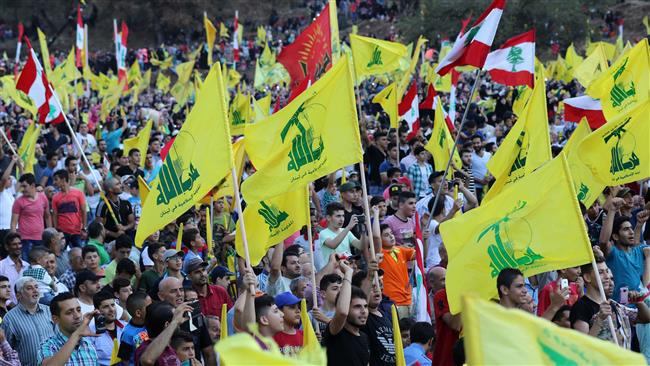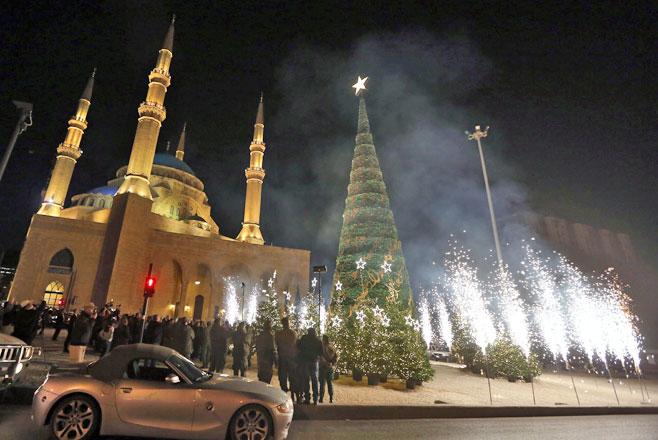You are here
Lebanon elects Aoun president, ending two-year vacuum
By AFP - Oct 31,2016 - Last updated at Oct 31,2016

Lebanese President-elect Michel Aoun walks on the red carpet past an honour guard as he arrives at the presidential palace in Baabda, east of Beirut, on Monday, after he was elected, ending a political vacuum of more than two years (AFP photo)
BEIRUT — Lebanese lawmakers ended a two-year political vacuum on Monday by electing as president ex-army chief Michel Aoun, who promised to protect the country from spillover from the war in Syria.
The deeply divided parliament took four rounds of voting to elect 81-year-old Aoun, whose supporters flooded streets across the country waving his party's orange flag.
"Lebanon is still treading through a minefield, but it has been spared the fires burning across the region," Aoun said after taking the presidential oath.
"It remains a priority to prevent any sparks from reaching Lebanon," the Maronite Christian leader said.
Syria's five-year war has been a major fault line for Lebanon's political class, and analysts have warned Aoun's election will not be a "magic wand" for divisions that have long plagued parliamentarians.
The next challenge will be forming a government, which is expected to take months of wrangling.
Presidential media office chief Rafik Chlala told reporters consultations on naming a premier would begin within 48 hours.
It remains unclear if Lebanon’s perpetually ineffectual political class can solve key problems such as a trash crisis that has seen rubbish pile up in open dumps.
The parliament that elected Aoun has twice extended its own mandate, avoiding elections, because of disagreements over a new electoral law.
Aoun had long eyed the presidency, and his candidacy was backed from the beginning by Shiite movement Hizbollah, his ally since a surprise rapprochement in 2006.
‘Dream come true’
But the key to clinching the post was the shock support of two of his greatest rivals: Christian Lebanese Forces leader Samir Geagea and Sunni former premier Saad Hariri.
Hariri, expected to be appointed prime minister, said his endorsement was necessary to “protect Lebanon, protect the [political] system, protect the state and protect the Lebanese people”.
Hariri and Geagea both oppose Syria’s Bashar Assad, while Hizbollah and its allies have supported Damascus, also dispatching fighters to bolster its forces.
That feud left lawmakers repeatedly unable to reach consensus on the presidency, a post reserved for a Maronite Christian and elected by parliament.
After taking the oath, Aoun rode in a convoy of black cars to the presidential palace in Baabda, east of Beirut, where his wife and three daughters were waiting to congratulate him.
In Beirut’s majority-Christian neighbourhood of Ashrafiyeh, revellers launched fireworks and loosed volleys of celebratory gunfire.
The atmosphere in Jdeideh outside Beirut was one of untrammelled joy, with thousands honking car horns and popping bottles of champagne.
“I’m so happy. After 25 years our dream has come true,” said 33-year-old accountant Giselle Tammam.
European Union diplomatic chief Federica Mogherini said Aoun’s election “opens the way for all political parties to now engage in constructive dialogue” to address the needs of Lebanese citizens.
Iran “congratulated” the Lebanese people, calling the election “an important step to entrench democracy and ensure Lebanon’s stability”.
Franjieh ‘respects result’
In addition to promises of economic growth and security, Aoun said Lebanon’s government must work to ensure Syrian refugees “can return quickly” to their neighbouring homeland.
The influx of more than 1 million Syrian refugees has tested the country’s limited resources, already strained by hundreds of thousands of displaced Palestinians who live in squalid and often lawless camps.
Lebanon’s 127 lawmakers took nearly two hours to elect Aoun, who failed to secure a two-thirds majority in the first round, triggering a second.
The second round was repeated twice, after 128 ballots — exceeding the number of MPs — were cast.
At times the session threatened to descend into farce, with votes cast for pop star Myriam Klink and “Zorba the Greek”.
Other lawmakers, including from Speaker Nabih Berri’s bloc, cast blank ballots in protest at the horsetrading that secured Aoun’s candidacy.
“A blank ballot is an objection to the way things were done,” MP Ali Khreis told AFP before the vote.
“This country doesn’t run on bilateral or trilateral agreements — we believe in dialogue.”
But Aoun eventually secured 83 votes, far more than the 50-percent-plus-one majority needed for a second-round victory.
After announcing Aoun’s win, Berri said the election “should be a beginning, not an end”.
“This parliament is ready to extend its hand to lift up Lebanon,” he said.
Christian politician Sleiman Franjieh — a childhood friend of Syria’s Assad and Berri’s favoured candidate — said he “respected the result”.
“We’ll see what is proposed to us for the government,” he tweeted, hinting at a potential ministerial post as a consolation prize.
Related Articles
BEIRUT — Twenty-six years after being forced from Lebanon's presidential palace and into exile by the Syrian army, Michel Aoun is set to be
BEIRUT, Lebanon — Lebanon’s parliament is set to re-elect Nabih Berri as its speaker on Wednesday, extending the veteran politician’s tenure
BEIRUT — Former Lebanese prime minister, Saad Hariri, said on Sunday he would continue to pursue a power-sharing solution to the country's 1














